Pendragon RPG Solo Session 0
My first experience with the once and future king of Arthurian RPGs
A couple days ago, I realized…I had a problem.
One maybe many of you can relate to - too many games, not enough time. (Especially with too much work, family responsibilities, and so on cutting into that sweet, sweet game time).
I’ve already got one big table a week I run a regular game for (see my post about the ongoing Keep on the Borderlands B/X game HERE) but, unlike some - I play solo as a refuge from group play, not as a less-satisfying-alternative.
I know I’m lucky to have a good table of regular players, but sometimes I just like the peace and quiet of unbridled imagination at my own pace. I play solo once or twice a week depending on schedule.
Anyhow - my binders and notebooks were getting a little scattered, my brain going in every direction at once, and that was making my nice peaceful solo hobby feel stressful and not fun.
So I asked via Substack notes and Twitter poll: What should I do next?
Since my solo games also get a sketchbook dedicated, this means where will my solo play go, but also my artwork over the next few months - the people replied with a resounding: PENDRAGON.
I’ve never played Pendragon before, and have never even looked at a ruleset. I have an enduring love for all things Arthurian, but I would definitely not consider myself a scholar.
I had my work cut out for me.
After finding a nice physical set of the 1E rules online for just a few bucks (without box, but with the bitchin’ map!), I scanned. I perused. I re-read. I squinted. I strained.
I realized - this wasn’t going to be a walk in the park.
First, I have played D&D or “adjacent” games…forever, the only notable exception being Cyberpunk 2020 as a kid, so my mental flexibility for extremely different rulesets is, shall we say, limited.
Pendragon is weird, because while it’s a “light” game on the surface mechanically (roll under everything with d20, use d6’s for damage and other stuff), it is actually immensely complex, especially when considering the pretty staggering amount of supplements out there.
Every adventure/campaign and setting book seemingly changes or modifies all the rules before it - this is cool in a way because they’re also modular - wanna add more complexity and depth to feasts? Buy that book. More character creation? More battles? And so on.
However!
What really stuck out to me as a dyed-in-the-wool D&D style DM - and what is still baffling me a bit - is…how do I run a session of this game? The broader time frame, the setting specific stuff, the history lessons in each booklet…I started to feel overwhelmed.
Then I remembered: this is a f*ckin’ game. It is supposed to be fun, and it can be played however the heck I want it to.
I went ahead and ordered the new 6th edition stuff, and the starter…and the Grey Knight Campaign (I know, it’s a lot!), as well as a plethora of setting inspiration stuff for the era and flavor.
Then I realized: I may use very little of this in the long run. This is a mythic dark ages, and as such, I can make up literally any damn thing I choose. What interests me about the feel and vibe of this whole thing? What do I want to spend my sessions doing?
I pumped the brakes, enjoyed some reading, and started doing some artwork to get into the feel of things, which is always my first step anyways.
I played a few fights with a young Saxon to get the feel for the system a little with 1E.
I started to think about what I would want my knight to look like, what his heraldry would be. What would his main sources of conflict be, and what are his hopes for the future? What aspects of this game do I want to lean into?
For Pendragon, my hope was a game where I could lean into the combat, the building up from nothing aspect, eventually commanding men and maintaining a domain in a dark but wondrous mythic era Britain.
My first session was brief, using these rules and oracles:
I decided to use a “yes/no” oracle by throwing a white “yes” die against a red “no” die. Very likely or unlikely receive a third die to modify the throw . (Thanks to Matthew Jackson for his inspiration with this type of oracle.)
I also printed out the “One Page Mythic” sheet, as well as the one page adventure and location sheets, and decided this would be only “oracles,” except for:
If stuck, I have an Arthurian encyclopedia and a copy of Malory’s "Le Morte D’Arthur” sitting there - flip to random page and pull nouns and verbs as needed.
I looked at what was happening in my beginning year: 508 - two years before Arthur pulls the sword from an anvil in a Londinium churchyard.
(Using the new core book for character creation, I followed their recommendation to be from Sarum in Salisbury, and to be Cymric and Christian.)
Saxons have just pushed further into the region under two famous brothers, and established the Kingdom of Wessex, dangerously close to the borders of Salisbury.
My knight, Aeric, a young Cymric who has recently converted to Christianity because of the knight he squired under, Dafyd, and three of his friends: Gwion, Madog, Tyngyr, and their squires, have been tasked with scouting out the woods and fields near the border where reports of Saxon raids have been coming in steadily.
Aeric’s main conflict is with his father, as his family has long been pagan and kept to an ancestral worship of the field and forest - their heraldry, golden stag antlers on a field of green, represent their affinity with the natural world and its power.
All his friends are Christian, but none of them are devout - the two elder, Madog and Tyngyr, are respected fighters, but are both notorious drinkers with bad tempers. Gwion is very young like Aeric and just knighted, and considered to be a bit soft for this sort of work by his peers.
Using a few dice rolls, it was determined that after a day’s ride, a Saxon raiding party of 7 unmounted men, obviously part of a larger force, were scouting the area, on the edge of the woods - too close to Salisbury estates for comfort.
Our leader, Madog, orders a charge.
Things deteriorated rapidly for Aeric from there. My first roll dictates a shattered lance, and the Saxon I’m fighting against (even with all my bonuses and his negatives), hits me square and hard in the chest with an axe, driving me from the saddle (failed DEX check!).
Although the axe blow does no damage due to my armor and shield, the fall ignores armor and does a few points, and I suffer a minor wound.
The rest of my party fares better - on Aeric’s next round, he fumbles, dropping his sword, and takes another wound from the Saxon who must be thinking…”they sent this guy?”
Criticals from the others in my party are hacking the Saxons up, except Gwion, also driven from his saddle for enough damage to seriously hurt him.
Aeric finally turns the tide by remembering his “Hate: Saxons” passion, as do the rest, scoring a major bonus for the rest of the fight, crushing the Saxons and forcing the last 2 to surrender before they can be butchered. A few rolls were made here of “Mercy” vs. “Hate” passions, and it was decided to spare them but take them prisoner to interrogate.
Around this time, the sound of mighty hoofbeats is heard, and through the woods, the young knights spot the main Saxon force riding this way!
This is where things got interrupted and I decided it was good enough for an opening session.
I have no idea where things will go, but I hope you enjoyed this “Session 0-1” recap. If you have any questions, suggestions, or comments, please do take the time to drop one here, and let me know if you’re onboard for this one.
I’ll also be updating this blog with other stuff from my group B/X Borderlands campaign, and whatever else I feel like, but I’m committing to running this Pendragon campaign for at least 3 months or so, and looking to fill up a 90 page Moleskine art book with what comes from that inspiration.
Keep Your Blades Sharp! (Here’s a famous one below…)


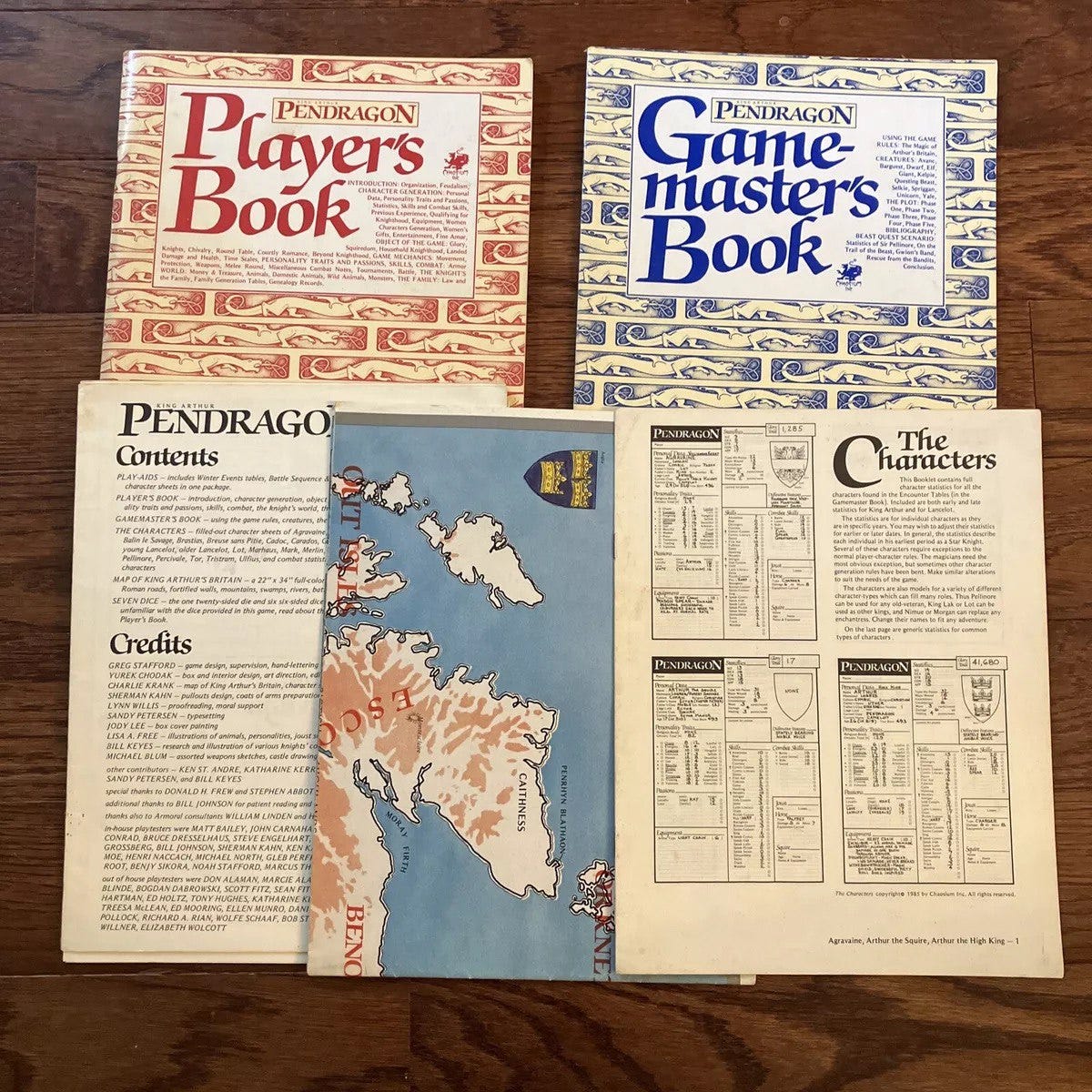

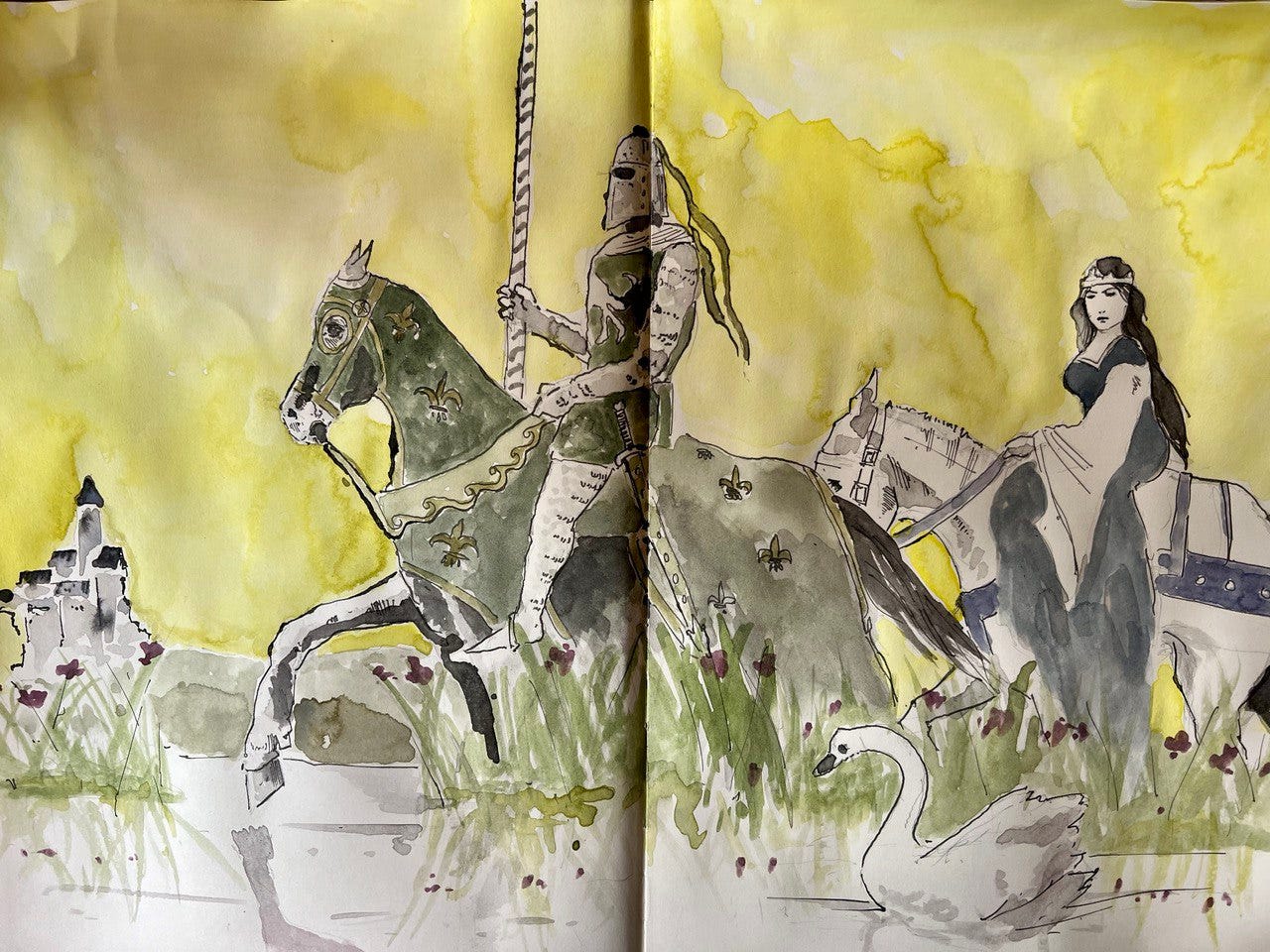
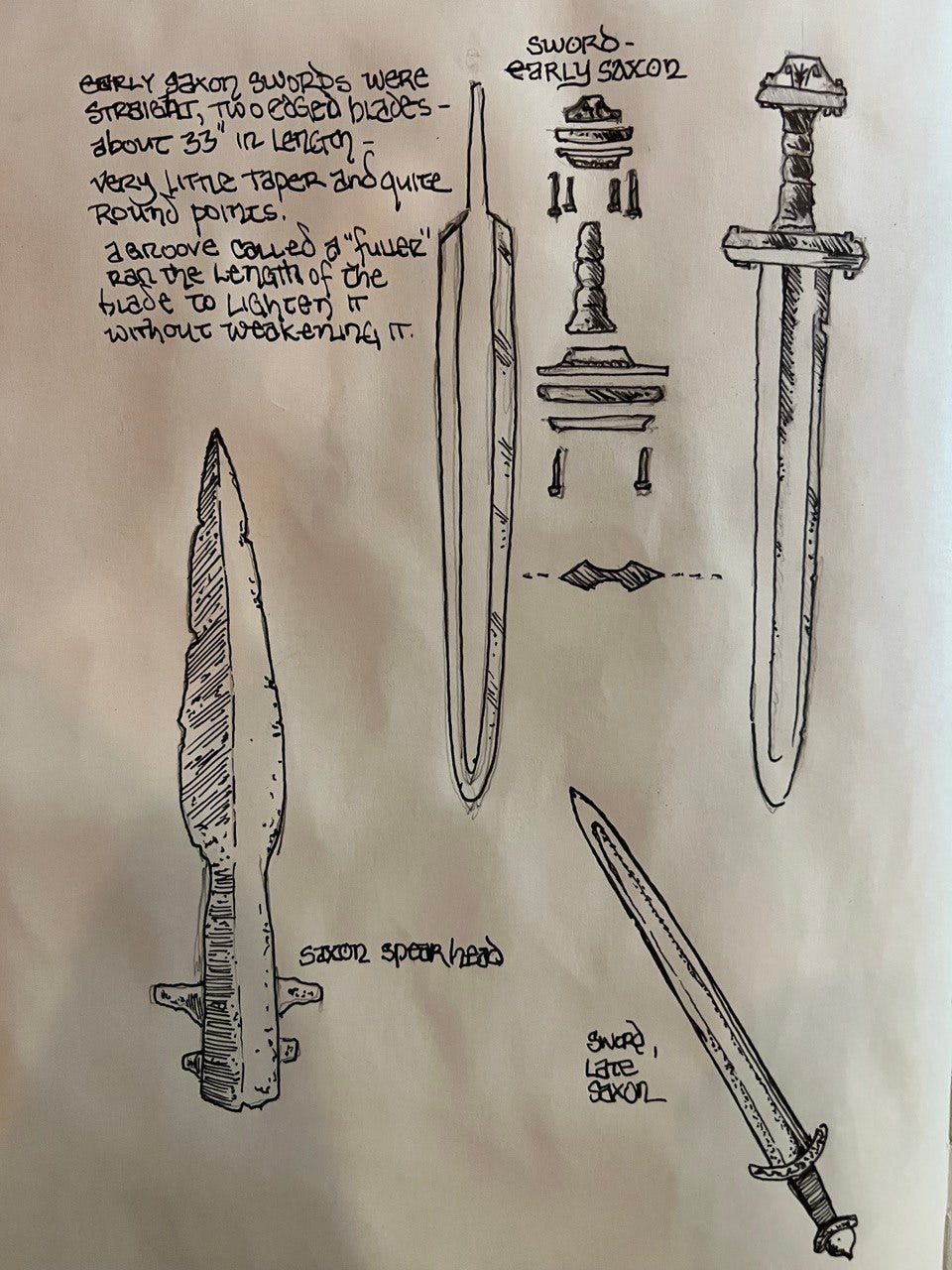
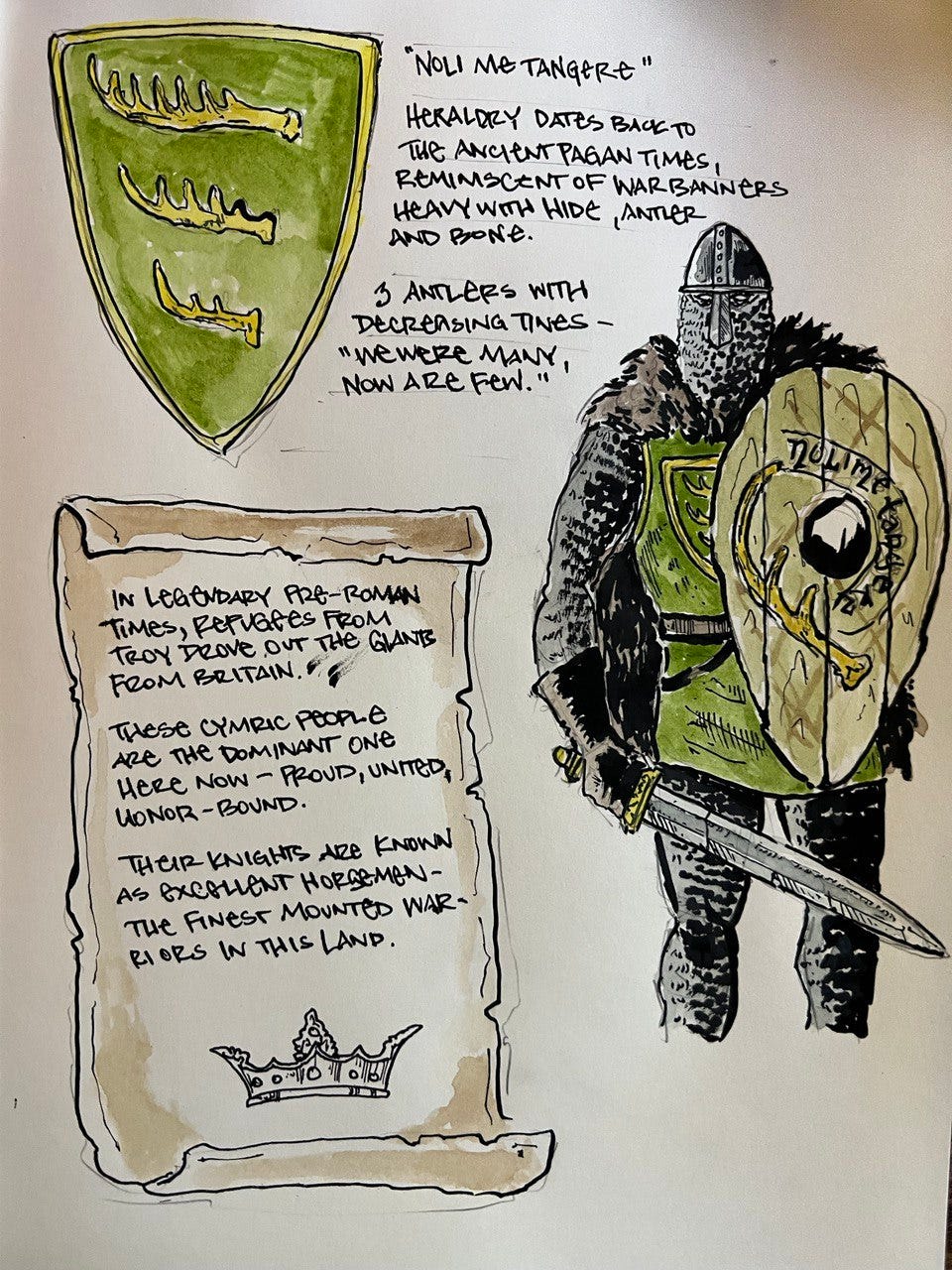
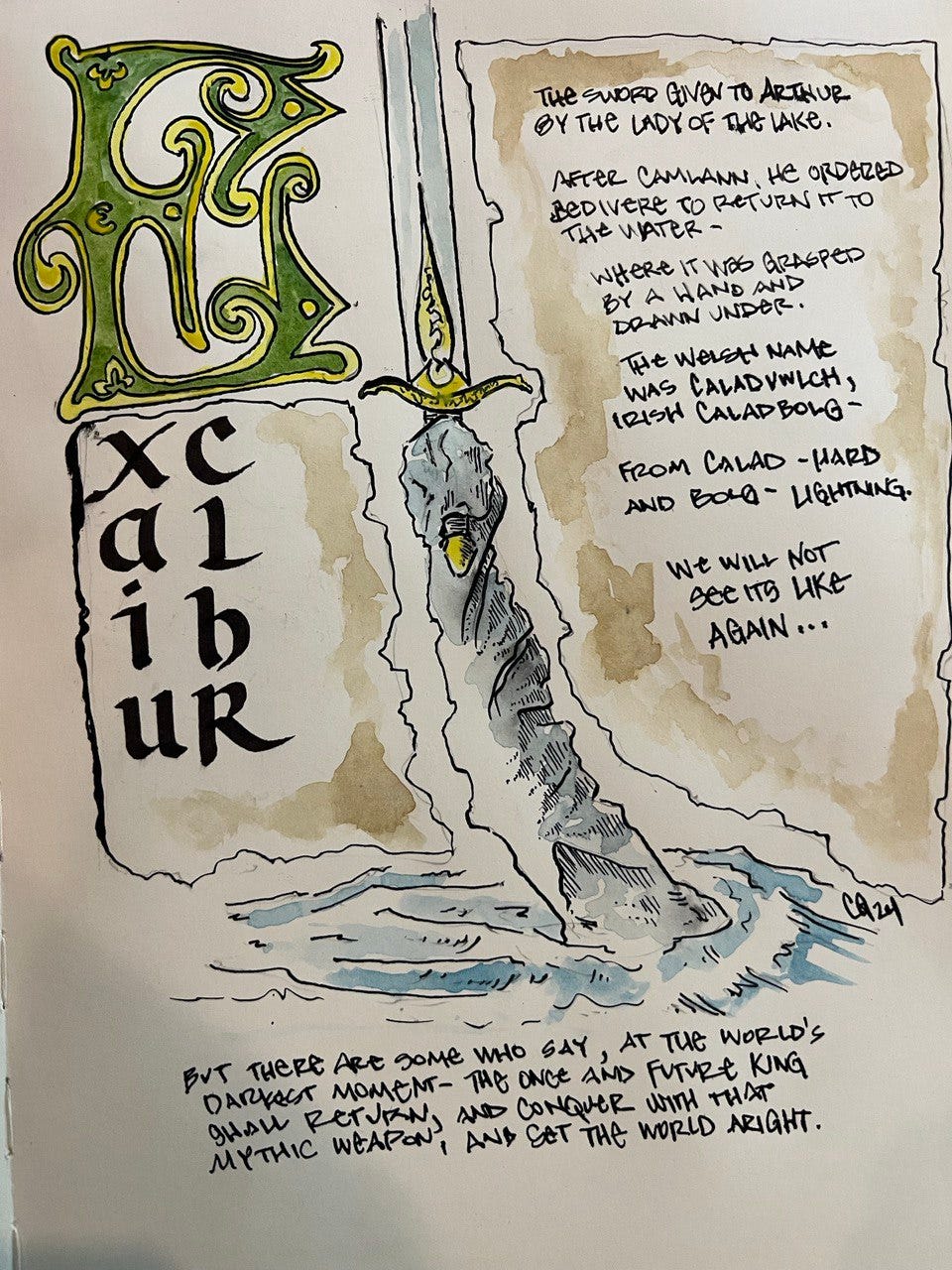
Really like this beginning!! Very interested to see how you handle Pendragon as a solo game, so more soon please!
Such a great reminder that, when playing solo games, we do it for our own entertainment. We don't have to be perfect. We don't have to justify our choices or interpretations of the rules.